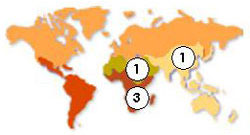| |
|
| Health and Social Services "Everyone has the right to a standard of living adequate for the health and well-being of himself and of his family, including food, clothing, housing and medical care and necessary social services, and the right to security in the event of unemployment, sickness, disability, widowhood, old age or other lack of livelihood in circumstances beyond his control." (Universal Declaration of Human Rights, Paris 1948, art. 25) "Everyone, as a member of society, has the right to social security and is entitled to realization, through national effort and international co-operation and in accordance with the organization and resources of each State, of the economic, social and cultural rights indispensable for his dignity and the free development of his personality."(Universal Declaration of Human Rights, Paris 1948, art. 22) |
 Ill health causes and contributes to poverty by destroying livelihoods, reducing worker productivity, lowering educational achievement and limiting opportunities. Because poverty may lead to diminished access to medical care, increased exposure to environmental risks, and malnutrition, ill health is also often a consequence of poverty. Accordingly, ill health is both a cause and a consequence of poverty: sick people are more likely to become poor and the poor are more vulnerable to disease and disability.
Ill health causes and contributes to poverty by destroying livelihoods, reducing worker productivity, lowering educational achievement and limiting opportunities. Because poverty may lead to diminished access to medical care, increased exposure to environmental risks, and malnutrition, ill health is also often a consequence of poverty. Accordingly, ill health is both a cause and a consequence of poverty: sick people are more likely to become poor and the poor are more vulnerable to disease and disability.
 | Regional Implementation This right is addressed by our projects in the following regions:
|
|
|
UNESCO SHS
Have feedback? Email the SHS Webmaster |
||